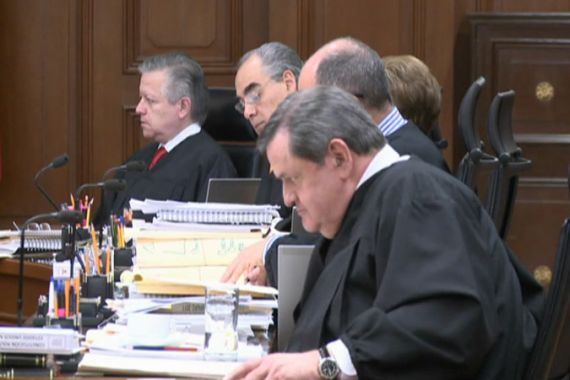Mexico court defers abortion law to states
Judges uphold state of Baja California’s constitutional amendment that says life begins at conception.

Mexico’s supreme court has upheld an anti-abortion amendment to the constitution of the northwestern state of Baja California that says that life begins at conception and effectively bans the medical procedure.
The ruling on Wednesday appeared to allow all of Mexico’s 31 states to decide individually on a woman’s right to abortion, though the court has also agreed to review a similar amendment from the north-central state of San Luis Potosi.
Sixteen of Mexico’s states have adopted right-to-life amendments that severely restrict abortions, though almost all continue to allow it under some circumstances as in the case of rape or danger to a mother’s life.
Mexico City is the only area that has legalised abortion on demand in the mother’s first trimester.
Allowing individual states to determine such issues may be the path of least conflict, but some activists said it could create two classes of women: those with the money to travel to Mexico City for a safe, legal abortion, and those in outlying states who might decide on illicit, back-alley abortions.
Mexico City’s governmental Human Rights Commission said it “regrets that this decision by the supreme court will worsen the serious public health problem of clandestine abortions in unhealthy conditions”.
“It is also very grave that a supposedly constitutional and democratic government like Mexico’s establishes different levels of human rights protection for women, depending in which state they live in,” it added.
Supporting the court’s decision, Marcela Ramos, an anti-abortion activist, told Al Jazeera: “A life is a life, and if we’re here it’s because our mothers accepted us, whatever the circumstance.”
‘Power of states’
Seven judges of the 11-member court voted to overturn the amendment, arguing it was a federal issue, or could violate federally guaranteed rights, but eight votes are needed to overturn a law on grounds of unconstitutionality, meaning the amendment stands.
The federal constitution does not take a position on when life begins, and while some judges argued there are implicit guarantees for the rights of fetuses in the document, most tried to stay away from arguments over abortion itself.
The court said in a statement that it “based its analysis strictly on constitutional issues. That is, the issue under debate was the power of states to legislate on topics that are not expressly determined by the federal constitution.”
The Baja California amendment was passed by the state legislature in 2008, took effect in 2009 and was quickly challenged in court by state human rights officials.
In a landmark 2008 ruling, the supreme court upheld Mexico City’s law legalising abortion by an eight to three vote.